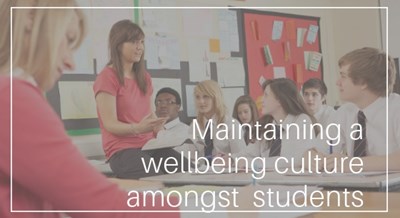
Adolescence brings a lot of change for any young person to go through, with friendships among peers being a potentially very influential part of a young person's life.
For most of us, we spend a large proportion of our time in the school setting, from as young as about three years of age to 18 years or thereabouts.
Nowadays, from a very young age, many children enter into a very different environment to what they are used to in the home setting. This may be playschool, montessori or primary school.
Dr Susan Healy, Consultant Child and Adolescent Psychiatrist at St Patrick’s Mental Health Services, takes us through the importance of friendships in these settings.
Paving the way for the future
These blocks are continuously being built, right through primary school into the adolescent years and, indeed, throughout adult life. You’re never too old to learn! What is being learned along the way paves the way for the future.
I’d like to talk about friendships in the adolescent years (13 to 18) and how important this is in the school setting.
Adolescence is one of the most rapid stages of brain development throughout life. This, coupled with the onset of the physical and hormonal changes of puberty, is undoubtedly a lot of change for any young person to go through. Yet we all have to go through it!
During this stage of development, young people can often find themselves wanting to spend more time with their peers than their parents or siblings. Therefore, friendships can be a very influential part of any young person’s life.
For adolescents, more time is spent in the school setting compared with childhood. Transition from primary school to secondary school can also be challenging for some young people. Some may enter larger classes, while some may know none or only a few people from their primary school who are also transitioning to secondary school, not to mention the increased workload.
So with all this in tow, some people may have different groups of friends, including best friends, casual friends and close friends. However, there are some young people who, for whatever reason, do not feel happy or comfortable with friendships in school or they may feel that they have few or no friends. This is an added burden to those who feel like this.
Supporting young people
Given that the school setting is a rather intense one with regular face-to-face contact and interaction with others, it’s important that young people feel comfortable for the most part. Difficulties with friendships in school can have a knock–on effect on other aspects of a young person’s life. Positive experiences with interaction and friendships with others can likewise have positive effects on aspects of a young person’s life.
The negative aspects young people experience around friendships are undoubtedly very difficult and these young people need to be fully supported through difficult times. Examples include difficult dynamics within groups of friends, changes to groups of friends, being bullied, exclusion from things, the challenges that social media can bring.
Does the perfect friendship exist? If we all had perfect friendships, I fear we would not have to face these challenges and, hence, not have the opportunity to become stronger and wiser as a result of coming through difficult times.
However, to do this alone is extremely difficult. Therefore, having people around to support young people, to listen to them, and to encourage them to communicate how they feel is so very important. We are all too familiar with stories we have read or heard about young people going to such lengths as to take their own lives. Sometimes with these unfortunate stories we hear, the young person may have been bullied. Bullying shouldn’t happen in our society but it does.
We should be pulling together to help who we can and teach our children to do the same thing. Teach this at school and at home, the two places that young people are practically guaranteed to be most of the time.
Valuing good teachers
When I think of school, I think about both the academic and social aspects of school. It’s important to remember the two are separate, but also interlinked. I still remember, in particular, one or two teachers I had in secondary school, who I looked up to and who, I must say, probably “made a difference”.
A good teacher can somehow be the glue that can hold a class together and bring out the positives and strengths in some or most of the young people they teach.
This, of course, can enhance a respect for a teacher and fellow pupils.
All people learn from good example and what better way to show it than in the classroom setting led by a good teacher. A good teacher, I believe, teaches more than the curriculum subject.
For a young person, attending a school with a good ethos around friendship, I believe, is key to that young person continuing on their journey to enhancing positive friendships. Most schools nowadays focus on friendship by having various aspects of this on the curriculum such as Friendship Week, anti-bullying policies, and various aspects around friendship in their programmes.
I believe one of the most important things in school is having access to good staff and teachers who are “clued in and have their ear to the ground”, for lack of a better word. I mean those who are tuned in to what is going on in the school and can identify if someone is having difficulties with a friend or peer group. It is essential that if someone, be it a young person, peer or parent brings a difficulty to the attention of a teacher or principal, this is explored and managed accordingly. Again, this can include incidents of bullying or other difficulties.
Embracing communication
Enhancing good communication is key to young people opening up and communicating about any problems they may be encountering. This should be in every possible way enhanced by parents and teachers, as we know that one of the most important factors to a young person’s mental wellbeing is their ability to communicate their difficulties in some way.
For young people going through adolescence, feeling accepted is so important to them. On our journey through life, we know that we feel accepted by some people, but not others. We learn along the way to feel okay about that and, if we can foster what we learn about ourselves and other people, we can hopefully become stronger for it.
Adolescents are really only starting this journey as they have more choice of who to befriend compared with childhood. Similar interests may pull people together and, indeed, those with totally opposite interests may also develop good friendships. It’s important that the young person feels the friendship overall is a positive one and it enhances their life, even though there may be the odd falling out or disagreement.
However, I must highlight that whatever happens in school around friendships, undoubtedly spills over to other aspects of life. Through social media, we are accessible practically 24/7 to our friends and those that are also not our friends. The school setting allows that face-to-face contact which nowadays is more important to grasp on to and enhance as so much communication outside of school is through the virtual world of social media. Indeed, some young people find avenues for friendships through social media which otherwise they may not have. That, of course, is positive but I think we must harvest our innate gift of face-to-face communication and nurture it. What better place to do this than in the school setting.
Fostering friendships
The school environment is an important place to help nurture friendships. It is a meeting place that is readily available for young people to socialise. It’s important that young people have adults in their lives to look out for them and talk to them. Parents need to be tuned into what’s going on in their children’s lives, especially in relation to their child’s friendships. Good communication between parents and school is important.
As we well know, the school environment can be experienced as a very unpleasant place for some and again, having support from adults to explore and work through these difficulties with young people and their parents is essential.
Therefore, fostering communication between friends, teachers, parents and whoever else is important in a young person’s life is important. And while here we have focused on the importance of friendships in the school setting, what we do to foster this also goes way beyond the school setting into all aspects of a young person’s life.


